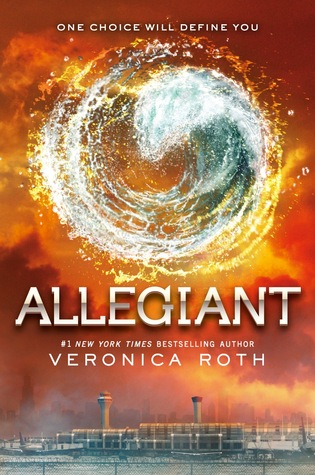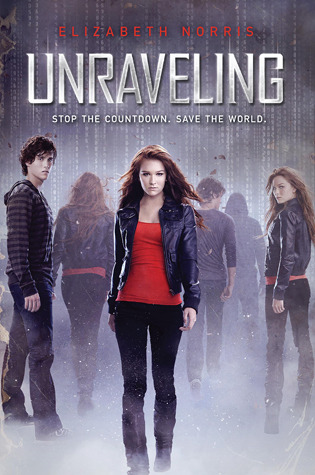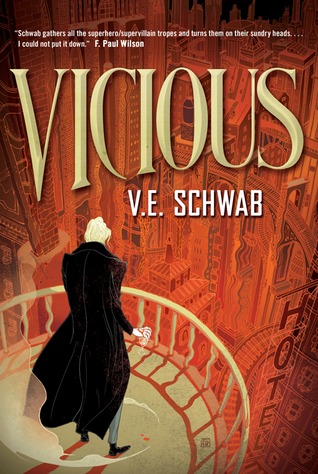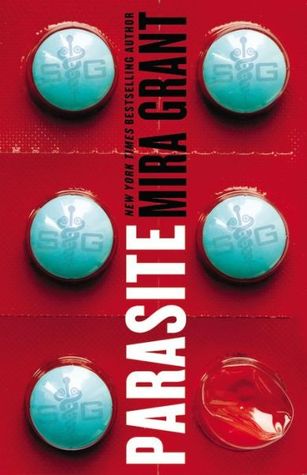Sci-fi month: "Because Science!" (a rant)
It's Sci fi month hosted by Oh, the Books! and Rinn Reads!
I was reading a book recently that decided that it would try and explain someone's superpowers with science. That's great, and being an engineer, seeing science in my books makes me very happy. Usually. In this case, the book's attempt at science made no sense, and was also completely unnecessary. It seems like a lot of books lately are deciding to explain the inexplicable with the blanket excuse, "Because science!" and I'm getting a little tired of it.
YA is most guilty. I don't know if it's because the authors feel like their audience isn't interested or smart enough to deal with actual science, or if it's because YA authors just don't like doing their research, but this excuse just seems like lazy writing to me.
I decided that I'd make a list of books that don't do the science in their science fiction justice, and pair them with books that do do a good job of explaining that area of science. The list is mostly YA science fiction, because as I said earlier, that's the genre that usually has a problem with faulty science. I'm going to include a list of adult science fiction books that do a great job of scientific accuracy/explanations at the bottom of this post as well.
Here goes!
Books with flawed science and some alternatives
The not so great
|
The great!
|
|
GENETICS
|
 What bugged me: This book is one of the worst about throwing its hands in the air and just saying "because genetics!" without any real understanding of what genetics can do. It's ridiculous to say genes determine our character traits. Psychosis or sociopathy, fine, but being selfish or less intelligent than average or more easily angered? Nope. | 
What made me smile:
This is a decidedly adult book, and one of my favorites. It's set in a world where the earth is in bad shape and very few foods can be grown due to genetic modifications. It also features a line of genetically modified humans known as "Windups". Not only is this book global in scope, talking about politics and environmentalism, it also has intensely personal stories to tell. The science and engineering are spot on, of course!
|
SEEMS LIKE PNR AT FIRST BUT TURNS VERY SCI-FI VERY FAST
(keeping this category vague to avoid spoiling the second half of both books, which have similar premises)
|
 What bugged me: There's a character in this book who has superpowers, which is totally fine. The problem is when he says he can "manipulate molecular bonds" and means that he can repair severed spinal cords and bring people back to life. Go ahead and repair those broken vases, but putting your chopped up carrot back together isn't going to bring it back to life. |

What made me smile:
Not only was this book excellent in its portrayal of a character with synesthesia, its use of the same explanation as Unraveling for some mysterious events was far more satisfactory. The science in this one just generally makes a lot more sense, and the unconventional characters (and romance) make this a better bet.
|
SUPERPOWERS
|
 What bugged me: There is an unexplained reason why people have superpowers (well, the implication is dear old science), and an unexplained reason why all those people live in precisely one community and an inexplicable reason why a group that is trying to hide their powers would let their kids have football matches against other normal schools. Also, apparently you can't use the knowledge you gain in the future to catch murderers. You just go with the flow and pick yourself a boyfriend... |
 What made me smile: This is more of a crossover or adult book than YA, and I really liked it. The explanation for how people acquire their powers is incredible and very haunting. The characters are all shades of gray and intense and you never know what to feel about them. There is a concentration of superhero people in one town, but they aren't limited to being there, and there are plenty of good reasons for keeping your powers hidden (or not). |
VIRUS-INDUCED DYSTOPIA/APOCALYPSE
|

What bugged me:
Rhine lives in a world where men die at 25 an women at 20, because of a virus that came about after all other diseases and disorders were cured. If it were a virus, why does it only affect the 2nd and successive generations of genetically engineered people? How can a virus kill everyone only at exactly the same age? The way the disorder was described, it seemed more like a genetic mutation to me - and that could easily be fixed in this world (everyone is genetically engineered in the first place). |

What made me smile:
In this world, humans created humanoid creatures called Partials, who unleash a virus that kills most of humanity and all newborns. The main character, Kira, is a medic and researcher, and there are discussions involving virology that are not only accurate but also very accessible. The science makes perfect sense without being overbearing and taking away from the intensity of the plot or the humanity of the characters. This book also just makes a lot more sense socioeconomically and politically as well.
|
Adult SF that puts the science in science fiction
I already mentioned Windup Girl and Vicious earlier, but here are some more:








Have you read these books and their alternatives? Did you notice some of the things I did, or do flawed scientific explanations not bother you at all? Let me know!





I totally agree with Allegiant. I read that book and thought, "This is Gattaca. She just watched Gattaca and decided to finish her book that way." For the overall story the "science" she used did not make any sense.
ReplyDeleteLove it. It has bugged me too, just call it magic if you have too, science that can be taken down by my history-major self isn't really science. Can't imagine how it goes down for people better versed than me.
ReplyDeleteWas the book that set this off trying to explain human regeneration by bringing up lizards growing back their tail by chance? =)
I totally agree with you! if you're going to explain somehting with science at least make sure it makes sense. I just can't stand 'science' explanations that don't make sense and in my opinion time travel falls into that category as well.
ReplyDeletePartials really is a science fiction book were the science is done well, there was so much explanation and reasonign behind everything and it made sense! I read ultraviolet quite some time ago so I can't remember much about it and the science aspect, I can only say I never expected there to be sci-fi in that book and that twist was really unexpected. I haven't read any of the other books on this list.
Oh, THANK YOU. You put this pet peeve of mine into words (and very lovely words they are, too). Pivot Point made me head-desk so hard.
ReplyDelete